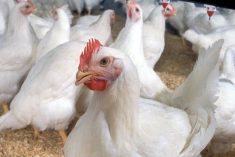[UPDATED] Beijing/Chicago | Reuters—Beijing has renewed registrations that allow hundreds of U.S. pork and poultry facilities to export to China, industry groups said on Monday, after lapses threatened shipments to the world’s largest meat importer.
The renewals are a relief to U.S. farmers and meat companies as they navigate trade disputes with major agricultural importers, including China and Canada, under President Donald Trump.
Why it matters: Both the U.S. and China have been major markets for Canadian meat exports
Read Also

Federal budget shows remaining disconnect between agriculture, policymakers, panelists say
Canada’s agriculture sector is still disconnected from policymakers in some ways, say panelists at a CAPI webinar
China is understood to have renewed for five years registrations for U.S. pork and poultry facilities that expired in February and over the weekend, according to the U.S. Meat Export Federation and the USA Poultry and Egg Export Council. Both groups said that U.S. beef facilities had not yet been renewed.
Shipments continued to clear customs from facilities with lapsed registrations, but U.S. exporters were unsure how long that would last.
“We were on pins and needles for a while,” said Greg Tyler, CEO of the USA Poultry and Egg Export Council.
Beijing requires food exporters to register with customs to sell products in China.
China’s customs website showedregistrations for more than 1,000 U.S. meat plants granted by China under the 2020 “Phase 1” trade deal lapsed on Sunday. That was roughly two-thirds of all those registered.
The trade deal ended the previous U.S.-China trade war with a pledge from Beijing to boost its purchases of U.S. goods and services, including meat, by $200 billion (C$285.7 billion) over two years. China did not reach the target, which was agreed shortly before the COVID-19 pandemic hit.
The U.S. Department of Agriculture did not immediately respond to a request for comment. The agency previously said China did not respond to repeated requests to renew plant registrations, potentially violating the Phase 1 agreement.
“We’re pleased to see progress on the pork facilities and hoping for similar news on beef as soon as possible,” said Joe Schuele, spokesman for the U.S. Meat Export Federation.
Beijing imposed retaliatory tariffs on some $21 billion (C$30 billion) worth of American farm goods this month, including 10 per cent duties on U.S. pork, beef and dairy.
In 2024, the U.S. was China’s third-largest meat supplier by volume, trailing Brazil and Argentina and accounting for nine per cent of China’s total meat imports. U.S. meat shipments to China reached $2.5 billion (C$3.6 billion) last year, making it the second largest exporter by value.
Exports of U.S. poultry products have suffered due to outbreaks of bird flu, but China remains an important market, Tyler said.
“We needed that market to stay open and these renewals were very important to that,” he said.














